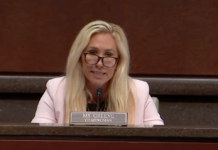
(Georgia Recorder) — It’s past the halfway point between the 2020 U.S. Census and the 2030 U.S. Census, but the battle over redistricting maps based on the last national headcount is still underway in Georgia. On Thursday, the 11th U.S. Circuit Court of Appeals will hear arguments about whether or not to enact new maps. The dispute stems from a claim that the state Legislature drew up maps that violate the Voting Rights Act and dilute the votes of Black Georgians.
In late 2023, the district court struck down those Congressional and legislative maps, and lawmakers returned to the Capitol for another stab at them.
Marina Jenkins, executive director of the National Redistricting Foundation and the National Democratic Redistricting Committee, said Georgia’s population growth in the 2020 Census came from minority populations, especially Black Georgians, but she said the General Assembly’s maps didn’t reflect that and that lawmakers engaged in dirty tricks by eliminating majority-minority districts to draw new ones.
“The state of Georgia robbed Peter in order to pay Paul by enacting these maps,” she said. “These maps eliminated existing opportunity districts in order to draw so-called new opportunity districts, zeroing out black opportunity statewide. Black Georgia voters who were previously denied their right to equal representation continue to be denied that right, and others had that right revoked altogether on these new maps.”
Much of the debate over the maps came down to the state’s 7th Congressional District, previously represented by Democratic Congresswoman Lucy McBath, which was redrawn to favor a Republican. Republican Rich McCormick now represents the 7th District, while McBath was elected to the 6th District after defeating fellow incumbent Democratic Congresswoman Carolyn Bourdeaux.
The old 7th’s population was not majority Black – the plurality of the population was white, but a combination of minority groups made up the majority. Of the district’s voting age population 27% were Black, 21% Hispanic, 15% Asian and about 33% white.
In a court document filed last year, attorneys for Georgia argued that the state was obligated to protect majority Black districts, not districts where a coalition of minorities make up the majority, and that efforts to overturn the maps are political sour grapes.
“Their argument proves only one thing: Plaintiffs are upset that the General Assembly eliminated a safe congressional district for Democrats when it created the required new majority-Black district. But the Voting Rights Act ‘is a balm for racial minorities, not political ones.’ It cannot be hijacked to settle partisan disputes that are fairly decided at the polls,” the state’s attorneys wrote.







